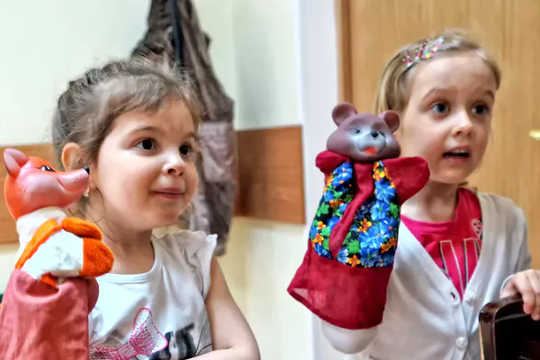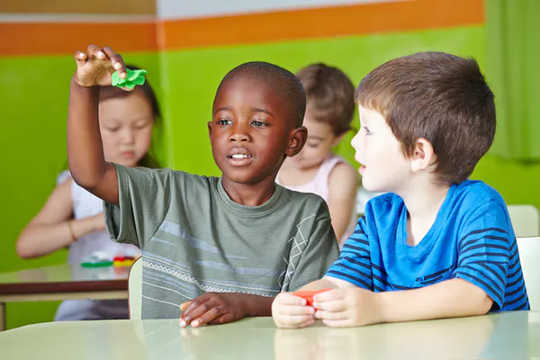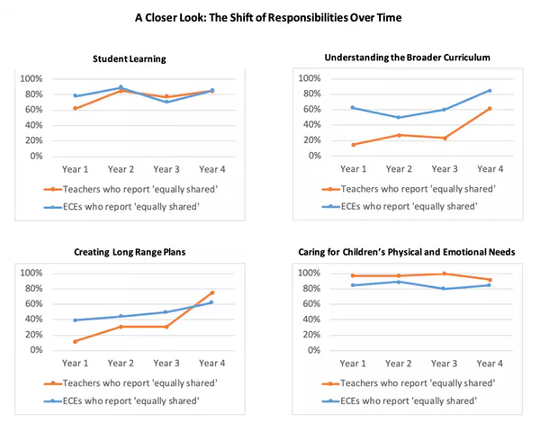 Our youngest learners benefit when educators with complementary skills combine their expertise. (Shutterstock)
Our youngest learners benefit when educators with complementary skills combine their expertise. (Shutterstock)
Why would we mess with success?
An innovative component of Ontario’s full-day kindergarten program is the educator team. We are talking about the dynamic staffing duo that leads every class in Ontario’s full-day kindergarten program — a certified teacher and a registered early childhood educator.
This strategic professional partnership sees two people seamlessly collaborate throughout the day to provide an enriched learning environment for children.
This bold new vision for kindergarten that Ontario introduced in 2010 is working yet its very existence is at stake.
Ontario’s kindergarten program was based on recommendations of the province’s special advisor on early learning. The redesign was informed by thousands of interviews, focus groups and published research on early childhood education.
When the new curiosity-driven, play-based full-day kindergarten program was implemented across the province, integral to the program model was its delivery by a new team.
The team has complementary skills, yet one sign of its success is that from the parents’ and children’s point of view, both educators in the class are equally called upon for communication and care.
Why is full-day kindergarten working so well?
Phasing in full-day kindergarten over five years allowed us to do a carefully designed long-term comparison of learning and social outcomes for children who began full-day or half-day kindergarten.
In our team’s longitudinal study, we followed children in both programs (full-day and half-day kindergarten) and tracked their development and progress for four years.
We documented clear results: the full-day children were significantly ahead of half-day children at the end of Grade 2 in reading, number knowledge, writing and self-regulation. Those children who were in full-day kindergarten also did better on the Grade 3 provincial reading test.
The research is continuing for four more years until the children finish Grade 6.
When asked why full-day kindergarten is working so well, we say: we have two years of junior and senior kindergarten, the play-based curriculum and the unique educator team.
The professional training of early childhood educators and certified teachers differs. Nevertheless, their knowledge base is complementary and provides an extensive breadth needed to respond to the interests and needs of young children while connecting to the rest of the school system.
This connection is important. The school system provides the platform for services within and across communities and this tie to schools has a positive long-term impact on children’s outcomes.
The full-day kindergarten program is currently and has always been naturally linked to schools. This connection allows the transition from early learning in kindergarten to formal school to happen seamlessly.
Early childhood educators are trained in child development, observation, documentation and play-based learning. They have knowledge of the social, emotional, physical and general cognitive development of children 0 – 12 years of age.
Certified teachers have training in the curriculum of the Ministry of Education and school board. A teacher assigned to kindergarten is certified as a primary junior teacher — they are qualified to instruct children ranging from kindergarten to Grade 6. Within this scope they understand learning expectations and assessment with a big-picture view on learning trajectories that extend into the upper years.
 Each student’s emotional, social and academic needs are considered by two invested educators who facilitate play-based learning that builds on children’s curiosity to learn. (Shutterstock)
Each student’s emotional, social and academic needs are considered by two invested educators who facilitate play-based learning that builds on children’s curiosity to learn. (Shutterstock)
The effective merger of these two distinct professionals, working collaboratively to co-teach and deliver a single curriculum, connects high quality early childhood practices and strong educational foundations in Ontario’s kindergarten classrooms for all students.
Twelve of fifteen tasks reported equally shared
Within our larger full-day kindergarten research study, Christina carried out research on the professional partnership between teachers and early childhood educators. She has worked in both roles in kindergarten classes.
We asked kindergarten educator teams about how they felt classroom responsibilities were shared within the kindergarten educator team. The preliminary results follow.
We asked: Who is responsible for student learning? Who is responsible for the daily planning of activities and organizing the learning environment? Who is responsible for supporting the children’s physical and emotional needs?
What we heard was that they work together as a team.
The majority of early childhood educators and teachers reported that supporting student learning is equally shared. They felt the same way about the facilitation of children’s play and social interactions, the daily planning of activities, the management of the class, supporting students emotionally and the list goes on.
We examined fifteen key classroom tasks; twelve were reported to be equally shared by the team.
Both teachers and early childhood educators agreed that formative assessment and formal reporting to parents are not equally shared. They said this is primarily the teacher’s responsibility.
Since full-day kindergarten began, there have been changes over time in the educators’ perceptions of classroom responsibility division. It was evident that following the first year of the program, educators moved towards greater agreement that they equally share classroom responsibilities.
The graphs here illustrate some findings on the alignment between early childhood educators (ECEs) and kindergarten teachers over time.

What the graphs show echoes earlier research: that with time and support, as two professionals work together they move towards more effective collaboration.
While the largest gap in perception was related to understanding the broader curriculum, this gap significantly decreased between year one and year four: in year one, 15 per cent of teachers and 62 per cent of early childhood educators thought an understanding of curriculum was broadly shared. By year four, the figure had respectively changed to 62 per cent and 85 per cent.
The effective partnership allows early childhood educators and certified teachers to integrate their professional knowledge and collaborate for student success.
Sharing of classroom responsibilities by the early childhood educator and kindergarten teacher benefits our youngest learners.
The team’s combined expertise in language development spans preverbal babbling to the complex reading and writing skills of Grade 6 students.
They hold extensive knowledge in all areas of child development and learning that ranges from birth to 12 years of age.
Ontario has the opportunity for continued leadership in early years’ professional partnerships and for tracking continued improvement in what is certainly an innovation in early years education. Let’s keep building on what we know works!![]()
About The Author
Janette Pelletier, Professor of Applied Psychology and Human Development, University of Toronto and Christina Moore, Research Manager, Dr. Eric Jackman Institute of Child Study, OISE, University of Toronto
This article is republished from The Conversation under a Creative Commons license. Read the original article.
Related Books
at InnerSelf Market and Amazon
























